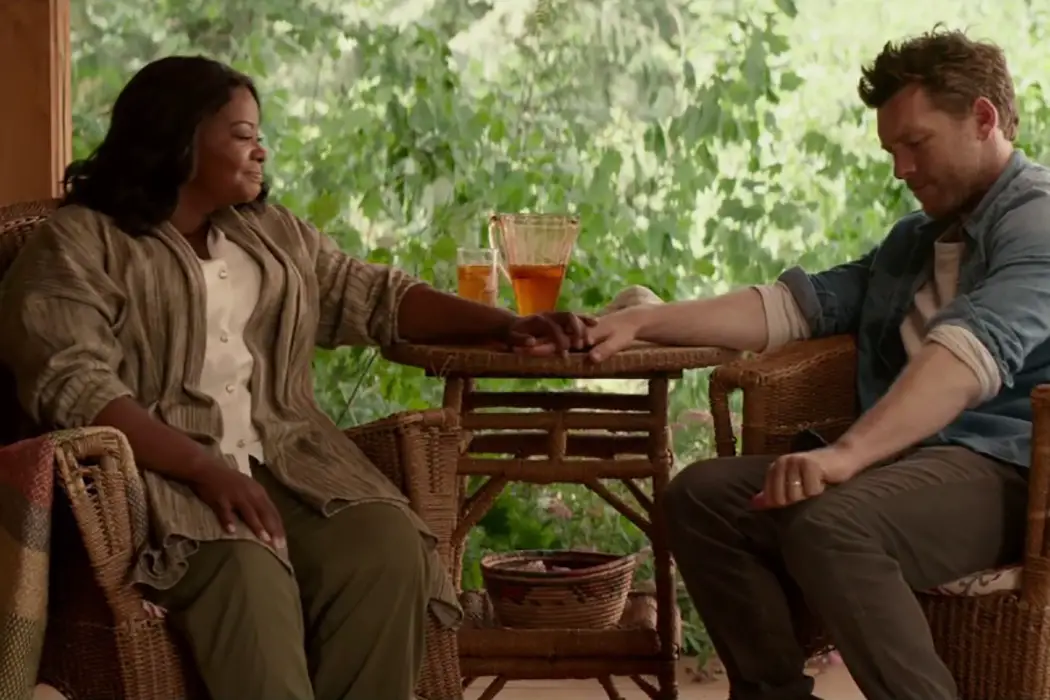THE SHACK: A Spiritual Journey Sparking Controversy

I'm Alice. I'm a writer, blogger, film nerd, determined dreamer,…
From Stuart Hazeldine, a director with very few credits to his name, The Shack has provided a positive breakthrough in the consortium of films that involve a strong presence of faith. But whilst audiences are able to relish in the spiritual and uplifting undertones of the story, it has somewhat proven to be a bit of a controversial storm amongst its critics.
Based on the New York Times best-selling novel, The Shack takes us on a mourning father’s tragic yet inspirational journey. After suffering a family tragedy, Mackenzie ‘Mack’ Phillips (Sam Worthington) spirals into a deep depression; causing him to question his inner beliefs.
Facing a crisis of faith, he receives a mysterious letter urging him to make his way to an abandoned shack deep in the Oregon wilderness. Despite his doubts, Mack makes the journey, and encounters an enigmatic trio of strangers symbolising the Holy Trinity, led by a woman named Papa (Octavia Spencer). Through this meeting, Mack finds important truths that will transform his understanding of the tragedy he’s experienced and change his way of thinking; ultimately altering his life forever.
Enlightening Or Dispiriting?
On one hand, we can look upon The Shack as a guide to understanding forgiveness and helping to process our grievances in a healthy way. This is undoubtedly the intention William P. Young had when he authored the novel back in 2007. To an extent, this is a believable mantra throughout the narrative of the movie, because of the impeccable acting from Spencer and Worthington. Their talents on-screen are undeniable, and the chemistry between the majority of the characters is very effective.
On the other hand, it’s been suggested that the film comes across as rather offensive and due to this, has sparked up a lot of debate with its audiences.
There appears to be a crossover between what is acceptable and what isn’t when it comes to the symbolisation of faith on the big screen. When Mack meets the three individuals, he immediately assumes that they represent the Trinity, but is surprised when he asks for God and all three of the gracious figures answer him. This reignited the controversy behind the theology of modalism, which says that God is one individual, presenting itself in three different ways – but is ultimately still one person.
Another argument that has circled around since before the film was even planned to be released, is the question of whether or not God really should be addressed as female. Although Papa is different from the way God is biblically characterised in gender, she still holds all the other necessary ideologies required to represent and embody this character. Papa is still compassionate, loving, peaceful and fully invested in Mack’s wellbeing. Which – for many – is where the frustration lies, but for others, is a delightful quality to the overall perception of the movie.

The book’s original publisher, Wayne Jacobsen, has recently explained that the decision to see God as a woman – and perhaps more importantly, as non-white – was to show that God can reveal himself and work through anyone.
However, the plot thickens further when we look at it from a heavily religious perspective. It could be argued that the film is too much of an emotional anchor, and that the use of a black woman as God is primarily designed to shut down any predicted opposition. Given that Papa is represented as a minority and as a woman, it could allow for claims of racism and sexism to anyone who objects or opposes to the unique theology.
But then why should God be so one-dimensional? The Shack paves the way for anyone of any faith and of their own beliefs to evaluate their own individual outlook, which provides leverage for all audiences to make a distinctive connection to the story and its characters.
A Raw Sentiment
Hazeldine, whose only previous feature is the 2009 psychological thriller Exam, chooses to take the route of stripped-back cinematography and eased paces from beginning to end. Visually, Mack’s sacred encounters in the deserted setting are pretty, especially the colourful diagrammatic of the surrounding gardens which are key to epitomise the tranquility of the setting. However, the visuals are still never particularly soul-stirring or enthralling. Even with esteemed cinematographer Declan Quinn on hand, crucial transitions seem to be rather lost, and the understated dramatic power of the real, natural setting seems wasted.

The benefit of this, however, is being able to focus more on the raw emotion and sentiment of the underlined story beyond special effects and clichéd gimmicks. This is essentially a journey of a character who has experienced a most tragic experience and needs healing in more ways than one. So whilst this makes for quite a distressing viewing, it is needed to create an authentic and convincing impact.
It’s clear that Hazeldine and his design crew wanted to shoot these supernatural encounters in a relatable light, which is an approach that’s echoed even in the screenplay and the dialogue.
Final Thoughts
The Shack successfully manages to challenge the narrow conceptions of what a Christian looks or sounds like – hence all of the debate and controversy. But it’s not necessarily the film’s ideas that are its problem, but the realness with which they’re explored.
It’s understandable to see why Christians may be up in arms at this portrayal of faith, because it’s one of the only instances where religious figures have been presented as physical beings and in this case, are depicted a bit like the featured celebrity guests of a talk show.
But The Shack also has a good chance of connecting commercially, because even though its drama is rather mushy, it’s a bit like a dream, whereas in real life, religion isn’t nearly as reassuring. Our current culture is starved for films that portray religious feelings in a way that’s relatable, and The Shack certainly does this. In some ways, it reduces faith to a kind of spiritual comfort food.
But maybe that’s what faith is on its way to becoming – and is that such a bad thing? How can we compare our own view of faith to someone else’s? In this instance it’s solely Mack’s experience – so who are we to judge?
Do you think The Shack succeeds at providing us with a religiously healing escape, or do you agree with the critics?
The Shack opened in the U.S. on March 3. The film will see release in the U.K. on June 9.
Does content like this matter to you?
Become a Member and support film journalism. Unlock access to all of Film Inquiry`s great articles. Join a community of like-minded readers who are passionate about cinema - get access to our private members Network, give back to independent filmmakers, and more.
I'm Alice. I'm a writer, blogger, film nerd, determined dreamer, foodie, vino inhaler and reality TV nut. I have ambitions to become a crazy dog lady in the very near future - www.welcometothelabyrinth.wordpress.com












